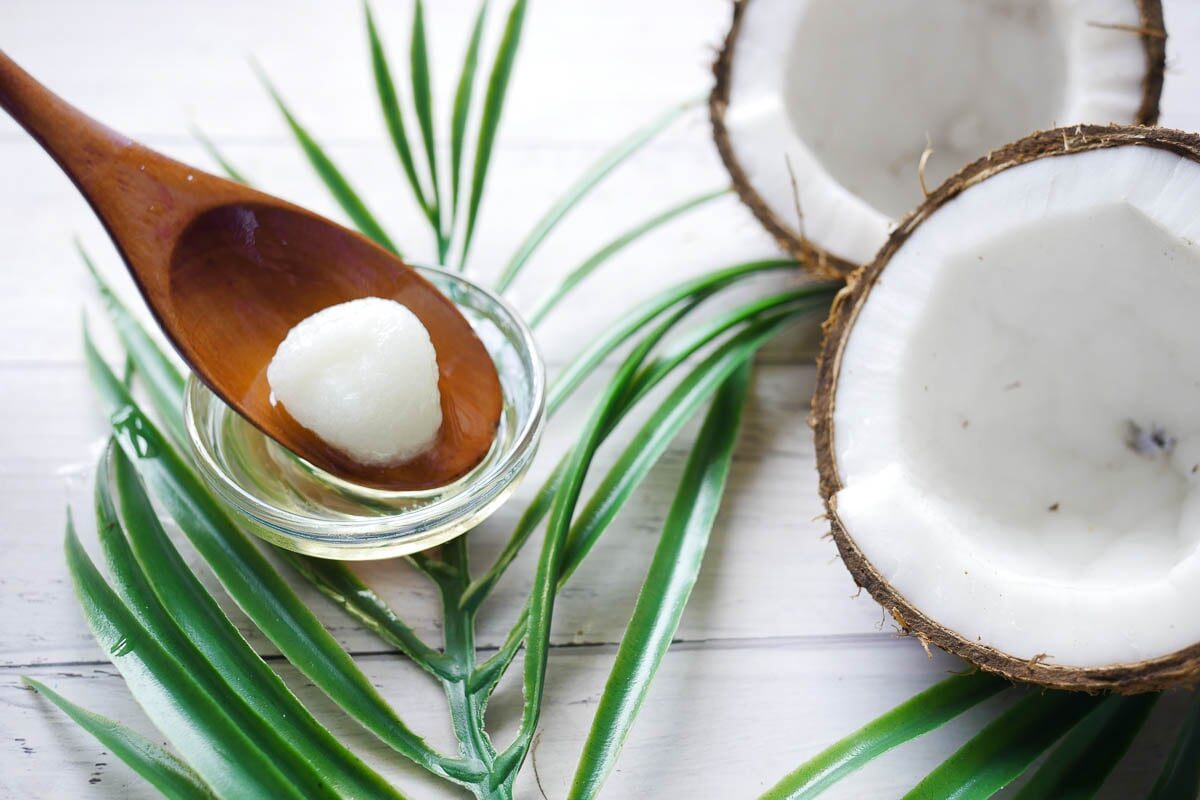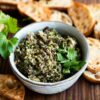
Coconut Oil Benefits
NEW!
Coconut oil is a popular healthy fat used in and out of the kitchen. It has some unique properties that make it great for cooking as well as skincare items like Homemade Deodorant and lotion.
I love getting all the coconut oil benefits by using it in everything from baked goods like my Gluten-Free Banana Muffins to smoothies like this Coconut Oil Smoothie. Let’s talk about the various uses of coconut oil and whether or not it’s right for you.
Table of ContentsWhat is Coconut Oil?MCT OilOlive Oil vs. Coconut OilHealth Benefits of Coconut OilCautionsCoconut Oil in RecipesNon-Food Uses of Coconut OilFAQsWhere to Buy
Shortly after trying my first green smoothie (the Best Green Smoothie), I started learning about how much foods interact with each other in my body. Fat-soluble vitamins like A, D, E and K need fat to help our bodies absorb them.
When I blend a Coconut Milk Smoothie, the fat from the coconut milk helps my body use all the vitamin A in this smoothie as well. This is also why I talk about boosting your smoothies with healthy fat. It’s a great way to help your body stay full longer and break down the vitamins you’re sipping.
Not everyone is a lover of this particular oil, and that’s okay! Let’s talk about it.
What is Coconut Oil?
Virgin coconut oil is made by pressing fresh coconut meat. Its refined version is made from pressing dried coconut meat, or copra. This pressing method can be done manually or with a machine.
You might see the term “expeller-pressed” on your container. This means a machine was used to extract the oil through heat or steam. Meanwhile, “cold-pressed” means that the oil was extracted without the use of heat and is often seen as the version that retains more nutrients.
The oil itself is made up of about 94% saturated fat and about 4% unsaturated fat. It has 62% medium fatty acids derived from lauric, caprylic and capric acids.
This unique oil can go from solid to liquid to solid right in your kitchen cabinet. If it’s temp is over 77°F it turns into a clear liquid, while below that temp it remains a white solid. When using this oil for baking, always check to directions to see if it needs to be in its solid or liquid form like when using butter.
Learn how to make coconut oil from the coconut mama if you want to experiment with making your own and reap coconut oil benefits in another way!
MCT Oil
Over 60 percent of coconut oil contains medium-chain fatty acids (or triglycerides), which are easily digested and sent right to the liver for energy production.
By traveling directly to the liver, it is not stored as fat and therefore MCT oil is known to help boost the metabolism, which is why you may see it discussed/promoted as a weight loss aid. These are the triglycerides that help keep skin smooth and moisturized by trapping the escaping moisture from pores.
These MCTs can be removed from coconut oil and used on their own, so you’ll see MCT oil sold by itself. I use it most in my daily healthy coffee and in these Coconut Cubes for smoothies.
Learn more about the MCT Oil vs. Coconut Oil debate to decide which to use. I use both!
Olive Oil vs. Coconut Oil
Most of the debate between coconut oil and olive oil stems from which one is more heart-healthy. According to the Cleveland Clinic, extra virgin olive oil has higher unsaturated fat, which may lead to lower inflammation, lower amounts of LDL or bad cholesterol levels and lower blood pressure.
A randomized study had people consume 50 grams (a little less than three tablespoons) of either extra virgin olive oil, extra virgin coconut oil or unsalted butter per day for four weeks. The results showed that the butter actually raised LDL cholesterol levels much more than both coconut oil and olive oil.
Even though oil from coconuts has a high saturated fat content, more research clearly needs to be done to determine how that affects the human body with regular consumption, as the above study results conclude.
Health Benefits of Coconut Oil
Let’s look at some of the main reasons why this oil is popular.
Alzheimer’s research shows that the antioxidants in coconut oil with neuroprotective properties might aid in the prevention and treatment of this disease.
Ayurvedic medicine has used this oil for almost 4,000 as a natural antibiotic.
The MCTs in coconut oil may aid in digestion, which is why I use them in my Metabolism Boosting Tea and Detox Tea recipes.
The lauric acid in this oil is both antimicrobial and antifungal.
An important note: People tout coconut oil as a hunger suppressant, yet it’s actually the MCT oil. If you want to add it into smoothies to feel full longer then use MCT oil specifically instead of coconut oil.
Cautions
As I mentioned above, coconut oil is super high in saturated fats. Since the American Heart Association and US Department of Health recommend less than 10% of calories from saturated fats per day, you should keep it to two tablespoons of coconut oil per day. A little goes a long way, so this isn’t hard to do!
There are conflicting views on whether this oil is considered heart-healthy. Studies show coconut oil increases both LDL (bad cholesterol) and HDL (good cholesterol) significantly more than other saturated vegetable fats, yet less than butter from animals.
If you’re at risk for heart disease and want to find the best cooking oil for you then consult your physician for help. Even if you aren’t at a higher risk, focusing on heart health can benefit all of us, so seek help when choosing the best nutrient-dense diet for you.
Coconut Oil in Recipes
As I decide what oils to use in cooking and baking I consider how the oil may change the flavor. If I’m making dressing with oil then I use a higher quality olive oil, as I know I will taste it. The same goes for cooking. Do I want my Sweet Potato Noodles to have a slight coconut flavor? Yes, the answer is yes, I do.
It also enhances the flavor of my Austinite Vegan Tacos, yet you get to decide what tastes good to you! If coconut isn’t your favorite flavor then stick to putting it in baked goods where it is more of a “hidden” ingredient, taste-wise, in recipes like my Vegan Blueberry Muffins and Gluten-Free Brownies.
The higher smoke point of coconut oil allows it to be a great oil to sauté onions and veggies for some Vegan Potato Soup or in this Red Lentil Soup.
Non-Food Uses of Coconut Oil
Now that we know a little bit more about the nutrition of coconut oil with regard to food uses, let’s talk about why I love using it throughout my whole house.
Widely used to help treat certain skin conditions due to both its anti-inflammatory properties as well as its antimicrobial and antioxidant properties.
Can help moisturize dry skin caused by frequent use of alcohol-based hand sanitizers.
Used in natural and homemade toothpaste. Some use it for oil pulling, claiming it helps get rid of bacteria in your mouth and whitens teeth.
Added to homemade vapor rub to gear up for cold and flu season.
I love it in my homemade deodorant for many of the same reasons I mentioned above in its application to treating skin conditions.
You can use it to lightly coat the inside of your nose if you get frequent nose bleeds or have dry nasal passages throughout winter.
How do you like to use this fun oil in your life? I’d love to know!
FAQs
There is no reason to eat a plain spoonful of coconut oil on a daily basis. Instead, include it in your toothpaste or as a cooking oil on your food. You can also use it externally and reap the benefits of applying it to your skin through deodorant, lotion, vapor rubs and more.
Both have great nutrients, antioxidants and benefits. Olive oil is low in saturated fat while coconut oil is high in this certain type of fat, therefore it is not considered a “heart healthy” oil.
Coconut oil is super moisturizing as well as antimicrobial and antibacterial and is loaded with antioxidants. It can help hydrate skin and treat a variety of skin conditions. Have you ever tried making your own deodorant? These properties make coconut oil a great ingredient in homemade deodorant!
Where to Buy
You can buy coconut oil practically everywhere, but you shouldn’t. The price varies wildly depending on where you pick it up. Decide what kind you want (cold pressed vs. expeller pressed, virgin vs. not, organic… there are so many choices).
I typically choose organic from either Trader Joe’s or Costco because they are the best price. If I’m not shopping at those locations then I will order some on Amazon.
Trader Joe’s: What’s not to love about Trader Joe’s, right? If you are lucky enough to live close to one, pick up a jar of organic virgin coconut oil!
Amazon: They have a variety of coconut oil brands and sizes. Here’s the coconut oil I buy!
Mountain Rose Herbs: I love this company out of Portland, Oregon. They sell a variety of coconut oils, yet the best is the virgin unrefined/cold-pressed coconut oil. Hands down the best quality at a pretty fair price!
Costco: They have great prices for unrefined, cold-pressed coconut oil! Definitely check it out if you have one in your area.
Overall, more research is needed to determine if coconut oil is the superhero some claim it to be. I use it alongside other healthy fats in cooking, baking and more. It isn’t the only oil I use as I believe you can have too much of a good thing so variety is key!
Do you already use coconut oil? If so, what’s your favorite use? Post it in the comments below!
The post Coconut Oil Benefits appeared first on Simple Green Smoothies.


